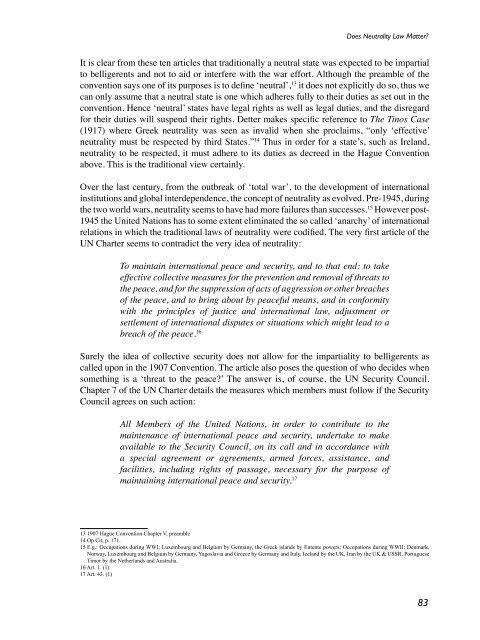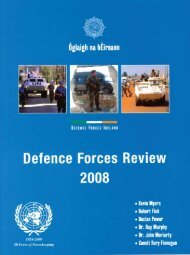Defence Forces Review 2010
Defence Forces Review 2010
Defence Forces Review 2010
You also want an ePaper? Increase the reach of your titles
YUMPU automatically turns print PDFs into web optimized ePapers that Google loves.
Does Neutrality Law Matter?It is clear from these ten articles that traditionally a neutral state was expected to be impartialto belligerents and not to aid or interfere with the war effort. Although the preamble of theconvention says one of its purposes is to define ‘neutral’, 13 it does not explicitly do so, thus wecan only assume that a neutral state is one which adheres fully to their duties as set out in theconvention. Hence ‘neutral’ states have legal rights as well as legal duties, and the disregardfor their duties will suspend their rights. Detter makes specific reference to The Tinos Case(1917) where Greek neutrality was seen as invalid when she proclaims, “only ‘effective’neutrality must be respected by third States.” 14 Thus in order for a state’s, such as Ireland,neutrality to be respected, it must adhere to its duties as decreed in the Hague Conventionabove. This is the traditional view certainly.Over the last century, from the outbreak of ‘total war’, to the development of internationalinstitutions and global interdependence, the concept of neutrality as evolved. Pre-1945, duringthe two world wars, neutrality seems to have had more failures than successes. 15 However post-1945 the United Nations has to some extent eliminated the so called ‘anarchy’ of internationalrelations in which the traditional laws of neutrality were codified. The very first article of theUN Charter seems to contradict the very idea of neutrality:To maintain international peace and security, and to that end: to takeeffective collective measures for the prevention and removal of threats tothe peace, and for the suppression of acts of aggression or other breachesof the peace, and to bring about by peaceful means, and in conformitywith the principles of justice and international law, adjustment orsettlement of international disputes or situations which might lead to abreach of the peace. 16Surely the idea of collective security does not allow for the impartiality to belligerents ascalled upon in the 1907 Convention. The article also poses the question of who decides whensomething is a ‘threat to the peace?’ The answer is, of course, the UN Security Council.Chapter 7 of the UN Charter details the measures which members must follow if the SecurityCouncil agrees on such action:All Members of the United Nations, in order to contribute to themaintenance of international peace and security, undertake to makeavailable to the Security Council, on its call and in accordance witha special agreement or agreements, armed forces, assistance, andfacilities, including rights of passage, necessary for the purpose ofmaintaining international peace and security. 1713 1907 Hague Convention Chapter V, preamble14 Op Cit, p. 171.15 E.g.: Occupations during WWI; Luxembourg and Belgium by Germany, the Greek islands by Entente powers; Occupations during WWII; Denmark,Norway, Luxembourg and Belgium by Germany, Yugoslavia and Greece by Germany and Italy, Iceland by the UK, Iran by the UK & USSR, PortugueseTimor by the Netherlands and Australia.16 Art. 1. (1)17 Art. 43. (1)83
















